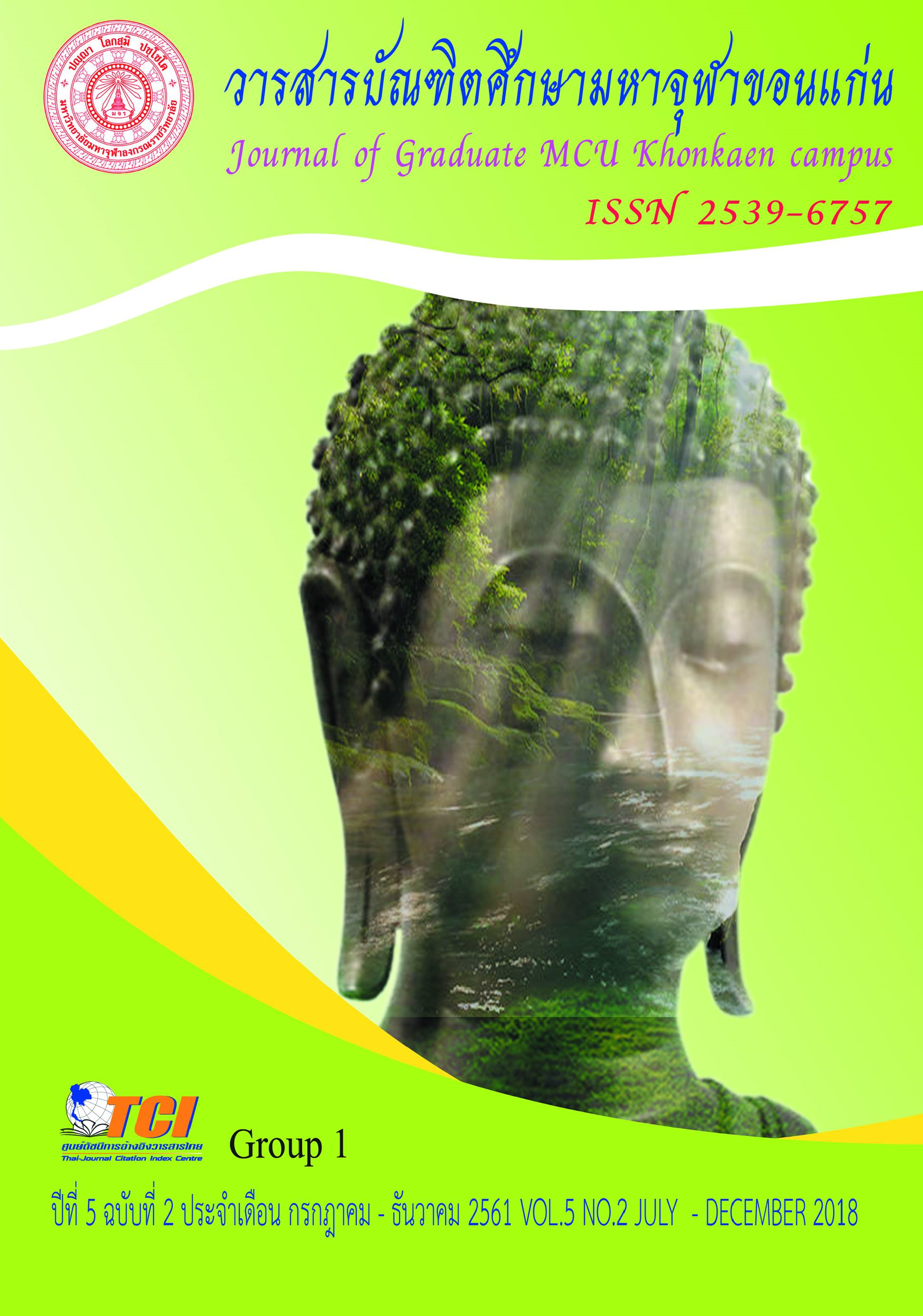รูปแบบการบริหารตามหลักธรรมาภิบาลของการบริหารกิจการบ้านเมืองที่ดีของผู้บริหารโรงเรียนมัธยมศึกษา สังกัดสำนักงานเขตพื้นที่การศึกษามัธยมศึกษาในภาคตะวันออกเฉียงเหนือตอนล่าง
Main Article Content
Abstract
การวิจัยครั้งนี้มีวัตถุประสงค์เพื่อ 1) ศึกษาความต้องการจำเป็นในการบริหารตามหลักธรรมาภิบาลของการบริหารกิจการบ้านเมืองที่ดีของผู้บริหารโรงเรียนมัธยมศึกษาสังกัดสำนักงานเขตพื้นที่การศึกษามัธยมศึกษาในภาคตะวันออกเฉียงเหนือตอนล่างโดยศึกษาจากผู้บริหารโรงเรียนมัธยมศึกษาจำนวน 196 คน ใช้แบบสอบถาม และตรวจสอบยืนยันผลจากผู้ทรงคุณวุฒิ ซึ่งเป็นตัวแทนจากสำนักงานเขตพื้นที่การศึกษามัธยมศึกษาในแต่ละเขตจำนวน 4 คน โดยใช้แบบสัมภาษณ์ 2) การสร้างรูปแบบ ได้ศึกษาเอกสาร แนวคิดทฤษฎีและงานวิจัยที่เกี่ยวข้อง และ 3) การประเมินประสิทธิภาพของรูปแบบ ใน 4 มิติ ได้แก่ (1) ความถูกต้อง (2) ความเหมาะสม (3) ความเป็นไปได้ในการนำไปปฏิบัติ ประเมินจากผู้ทรงคุณวุฒิ จำนวน 27 คน และ (4) ความเป็นประโยชน์ ประเมินจากผู้บริหารโรงเรียนมัธยมศึกษา จำนวน 42 คน ประเมินในหนึ่งมิติ คือ การวิเคราะห์ข้อมูลโดยการหาค่า PNI (Priority Needs Index) นำข้อคำถามที่มีค่า PNI เกิน 0.20 มาจัดลำดับความสำคัญค่าเฉลี่ย และส่วนเบี่ยงเบนมาตรฐาน
ผลการวิจัยพบว่า ความต้องการจำเป็น มีสภาพที่เป็นจริงอยู่ในระดับมากที่สุด และมีสภาพที่ควรจะเป็นอยู่ในระดับมาก ในส่วนของรูปแบบการบริหารตามหลักธรรมา
ภิบาล ของการบริหารกิจการบ้านเมืองที่ดีของผู้บริหารโรงเรียนมัธยมศึกษา สังกัดสำนักงานเขตพื้นที่การศึกษามัธยมศึกษาในภาคตะวันออกเฉียงเหนือตอนล่าง หรือ เรียกว่า
"10 Good Governance Model" ประกอบด้วย 1) แนวคิดและหลักการ 2) วัตถุประสงค์3) วิธีการดำเนินงาน มีองค์ประกอบ 10 หลัก ได้แก่ (1) หลักประสิทธิผล (2) หลักประสิทธิภาพ (3) หลักการตอบสนอง (4) หลักภาระรับผิดชอบ (5) หลักความโปร่งใส (6) หลักการมีส่วนร่วม (7) หลักการกระจายอำนาจ (8) หลักนิติธรรม (9) หลักความเสมอภาค และ (10) หลักมุ่งเน้นฉันทามติ 4) การประเมินผล และ 5) เงื่อนไขความสำเร็จและการประเมินประสิทธิภาพของรูปแบบที่มีความถูกต้อง ความเหมาะสม ความเป็นไปได้ในการนำไปปฏิบัติ อยู่ในระดับมาก และความเป็นประโยชน์ อยู่ในระดับมากที่สุด
This research was purposed to 1) Study the requirements from theschool administrates of Secondary Education School of 196 administrators, has used the questionnaire and examine the results by the specialist who as the representative of Regional Office of Secondary Education of 4 representatives by interviewing form, 2) Create the model, studied the documentaries, concept, theory and related research and 3) Evaluate the capability of model by the expertise who qualified as the experienced administrator according to Good Governance of 27 expertise. There is evaluated from evaluation form for 3 dimensions such as (1) Accuracy, (2) Suitability and (3) Feasibility of implementation. And the administrator of Secondary Education School of 42 administrators were evaluated by capability evaluation for utility, analyzed the data by calculate the PNI (Priority Needs Index) brought the questions that are over PNI 0.20 to prioritize based on needs, mean and standard deviation.
The research result has requirements reality was in a most level and should be was in a much level. Model of Good Governance for School Administers under the Secondary Educational Service Aare Office in the Northeast lower “10 Good Governance Model” consisted 1) Concept and principle, 2) Objective and 3) Operation with 10 elements such as
(1) Effectiveness (2) Performance (3) Responsibility (4) Accountability
(5) Transparency (6) Participation (7) Decentralization (8) Jurisprudence
(9) Equality and (10) primarily focus on consensus. 4) Assessment and 5) The conditions for success. Evaluate the capability of model with reasonable accuracy, the possibility of its implementation was in a much level and utility was in a most level
Article Details
References
Joyce, B. and M. Weil. (1985). Models of teaching. New Delhi : Printice Hall. Keawsee, P. (2001). Modeling the Leadership Development of School Administrators. Doctoral Thesis. Graduate School : Chulalongkorn University. Keeves, John. P. (1988). Educational research, Methodology and measurement : An international handbook. Oxford : Pergamon. Limjarern, M. (2017). Learning Management Model of the Second Army Education Center.Doctoral Thesis. Graduate School : NakhonRatcha simaRajabhat University. Office of the National Economic and Social Development Board. (2012). The Eleventh National Economic and Social Development Plan (20122016). Bangkok : Prime Minister. Office of the Public Sector Development Commission. (2010).Guide to Governance Levels.Bangkok :Peemaipro. Phuwatwaranon, S. (2012). Model of academic leadership development through integrated learning, For school administrators Under the Office of the Primary Education Service Area. Doctoral Thesis. Graduate School : Songklanakarin University. Pinitpong,V. (2014). Leadership Development Model of Participatory Leadership. Schools under the Office of the Secondary Education Region 14. Doctoral Thesis. Graduate School : NakhonRatchasima Rajabhat University. Rujarern, T. (2012). Professionalism in the management and administration of education. Bangkok : Kowfagn. Secretariat Office of the Teachers Council of Thailand. (2010). The standard of school administrators. Bangkok : Teachers Council. Srisaart B. (2013). Research Methodology. (5th ed.). Bangkok : Suveeriyasan. Thongphukdee, L. (2014). Development model Research of NakhonRatchasimaRajabhat University. Doctoral Thesis. Graduate School : Kasetsart University. Vongvanit, S. (2015). Research needs assessment. Bangkok : V print (1991). Wansut, A. (2016). A study of the characteristics of future professional school administrators. Doctoral Thesis. Graduate School : NakhonRatchasima Rajabhat University.

